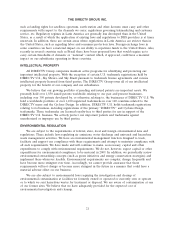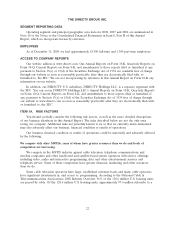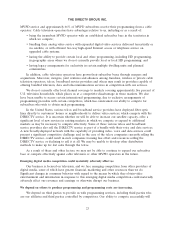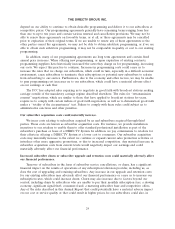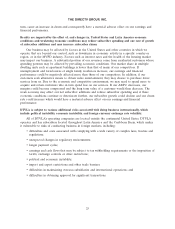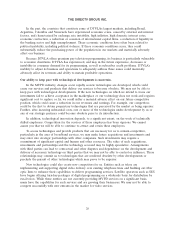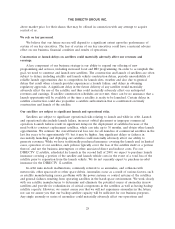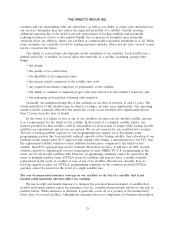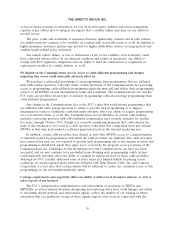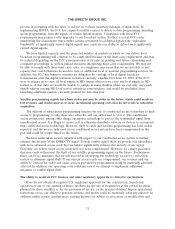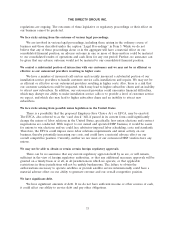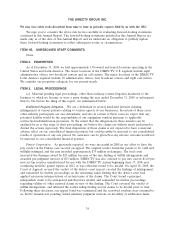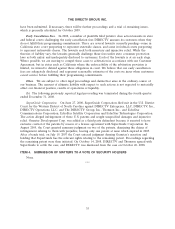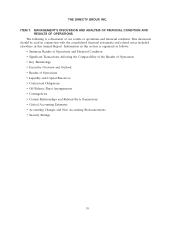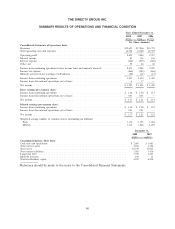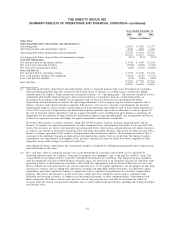DIRECTV 2008 Annual Report Download - page 44
Download and view the complete annual report
Please find page 44 of the 2008 DIRECTV annual report below. You can navigate through the pages in the report by either clicking on the pages listed below, or by using the keyword search tool below to find specific information within the annual report.THE DIRECTV GROUP, INC.
process of complying with the rules, or subject us to fines, monetary damages or injunctions. In
implementing SHVIA, the FCC has required satellite carriers to delete certain programming, including
sports programming, from the signals of certain distant stations. Compliance with those FCC
requirements may require costly upgrades to our broadcast system. Further, a recent FCC order
interpreting the requirement that satellite carriers retransmit local digital signals with ‘‘equivalent
bandwidth’’ of significantly viewed digital signals may constrain our ability to deliver such significantly
viewed digital signals.
We have limited capacity, and the projected number of markets in which we can deliver local
broadcast programming will continue to be constrained because of the must carry requirement and may
be reduced depending on the FCC’s interpretation of its rules in pending and future rulemaking and
complaint proceedings, as well as judicial decisions interpreting must carry requirements. We may not
be able to comply with these must carry rules, or compliance may mean that we are not able to use
capacity that could otherwise be used for new or additional local or national programming services. In
addition, the FCC has begun to consider an obligation for carriage of local digital broadcast
transmissions after the digital television transition currently scheduled for June 12, 2009. If the FCC
were to require us to carry all local signals in HD format wherever we carry any local signals in HD
format as of that date, we would be unable to comply in many markets where we currently carry such
signals without ceasing HD local service entirely in some markets, and would be precluded from
launching additional markets currently planned for later this year.
Satellite programming signals have been stolen and may be stolen in the future, which could result in
lost revenues and would cause us to incur incremental operating costs that do not result in subscriber
acquisition.
The delivery of subscription programming requires the use of conditional access technology to limit
access to programming to only those who subscribe and are authorized to view it. The conditional
access system uses, among other things, encryption technology to protect the transmitted signal from
unauthorized access. It is illegal to create, sell or otherwise distribute software or devices to circumvent
that conditional access technology. However, theft of cable and satellite programming has been widely
reported, and the access cards used in our conditional access system have been compromised in the
past and could be compromised in the future.
We have undertaken various initiatives with respect to our conditional access system to further
enhance the security of the DIRECTV signal. To help combat signal theft, we provide our subscribers
with more advanced access cards that we believe significantly enhance the security of our signal.
Currently, we believe these access cards have not been compromised. However, we cannot guarantee
that new cards will prevent the theft of our satellite programming signals in the future. Furthermore,
there can be no assurance that we will succeed in developing the technology we need to effectively
restrict or eliminate signal theft. If our current access cards are compromised, our revenue and our
ability to contract for video and audio services provided by programmers could be materially adversely
affected. In addition, our operating costs could increase if we attempt to implement additional
measures to combat signal theft.
The ability to maintain FCC licenses and other regulatory approvals is critical to our business.
If we do not obtain all requisite U.S. regulatory approvals for the construction, launch and
operation of any of our existing or future satellites for the use of frequencies at the orbital locations
planned for these satellites or for the provision of service, or the licenses obtained impose operational
restrictions on us, our ability to generate revenue and profits could be materially adversely affected. In
addition, under certain circumstances, existing licenses are subject to revocation or modification and
31


